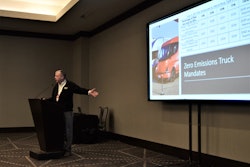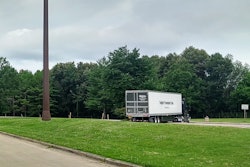Trucking news and briefs for Wednesday, Nov. 10, 2021:
Trucking orgs join lawsuit against COVID vaccine mandate
The American Trucking Associations, along with the Louisiana Motor Truck Association, the Mississippi Trucking Association and the Texas Trucking Association, on Tuesday led a number of supply chain groups in suing the Biden administration over its employer-based COVID-19 vaccine mandate.
ATA President and CEO Chris Spear said while his group in general supports vaccinations against COVID-19, "we believe that the Biden Administration has overstepped its statutory authority in issuing this Emergency Temporary Standard.
"This standard arbitrarily picks winners and losers and puts employers in an untenable position of forcing workers to choose between working and their private medical decisions, which is something that cannot be allowed," he said.
[Related: Small fleets in the catbird seat for growth: For-hire carrier size over the pandemic period]
ATA and its state partners filed their challenge in the U.S. Court of Appeals for the Fifth Circuit, where they were joined in the suit by the Food Marketing Institute, the International Warehouse Logistics Association, the National Association of Convenience Stores, the National Retail Federation, the National Association of Wholesaler-Distributors and the National Federation of Independent Business. The Truckload Carriers Association, while not part of the lawsuit, said it "will continue to work closely with, and fully supports the work being done by the ATA and our industry partners on behalf of the industry."

The Fifth Circuit Court of Appeals in New Orleans on Nov. 6, citing “grave statutory and constitutional issues," halted the vaccine mandate with an emergency motion to temporarily stay the rule’s enforcement pending expedited judicial review. States have also filed lawsuits in the Sixth, Eighth and Eleventh Circuit appeals courts challenging the mandate.
ATA is asking the court to stay implementation of the mandate "because we believe the Occupational Safety and Health Administration did not satisfy the statutory requirements for issuing this Emergency Temporary Standard instead of going through the proper rulemaking process,” said Nicholas Geale, ATA vice president of workforce policy.
Biden announces new plan to improve supply chain issues
President Joe Biden on Tuesday laid out how the recently passed infrastructure bill will help the current supply chain crisis through port improvements, along with freight system improvements, including a truck parking assessment.
In a fact sheet published Tuesday by the White House, the Biden administration announced some immediate actions it is taking, along with some near-term actions to help alleviate the supply chain issues.
One of the immediate actions is to alleviate congestion at Georgia’s Port of Savannah, which will include funding the Georgia Port Authority’s pop-up container yards project. This project allows the GPA to reallocate more than $8 million to convert existing inland facilities into five pop-up container yards in Georgia and North Carolina. Under the plan, the Port of Savannah will transfer containers via truck and rail further inland so that they can be closer to their final destination, which will make available valuable real estate closer to the port, the White House said. The effort will free up more dock space and speed goods flow in and out of the port, which leads the nation in containerized agricultural exports.
The U.S. Department of Transportation is also going to allow port authorities across the country to redirect project cost savings toward tackling supply chain challenges.
[Related: Supply chain crunch at the ports: Perspective from out East]
Also potentially affecting the trucking industry is the prioritization of key ports of entry for modernization and expansion within the next 90 days. The plan will identify $3.4 billion in investments to upgrade obsolete inspection facilities and allow more efficient trade through the country’s northern and southern borders.
Additionally, the DOT will develop and issue revised guidance on State Freight Plans that incorporates worldwide freight planning best practices. The White House says the infrastructure bill strengthens the freight plans that states are currently required to produce to include supply chain cargo flows, an inventory of commercial ports, the impacts of e-commerce on freight infrastructure, and an assessment of truck parking facilities. These improved plans, the White House adds, will help states direct resources to their greatest areas of need.
[Related: Intermodal haulers fight off a 'system collapse' at ports]
Introducing the 'AirBNB of truck parking'
The relatively new ParkStash app is now the official truck parking app for the city of Surrey, Manitoba.
Truckers can utilize ParkStash to find and book spaces there offered up by private property owners for per-hour and per-day fees. The app is available on iPhone and Android smartphone platforms as well as in a web app. There's not much in the way of spaces available there yet, but ParkStash President and Co-founder Hooman Bolandi said the company's just getting started.
 Find the ParkStash web and smartphone app via this link.
Find the ParkStash web and smartphone app via this link.
Fundamentally, "we connect entities with unused parking spots to drivers looking for one," Bolandi said, with hopes to improve quality of life for truckers long-term.









